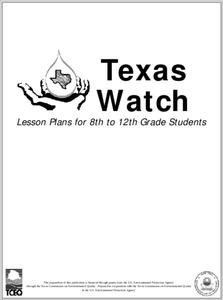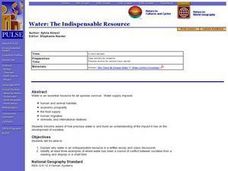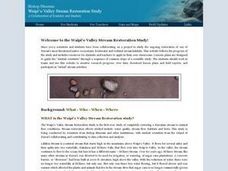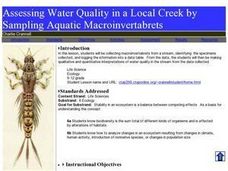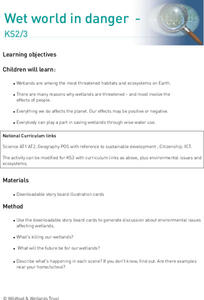Curated OER
Critters of the Water
Students examine different organisms in various marine habitats. They identify any adaptations that have allowed the organisms to survive. They develop an imaginary organism and describe its life cycle.
Curated OER
Animal Habitats
Students study the word habitat and its meaning. They also identify that in order for something to be classified as a habitat there needs to be the proper shelter, food, water, and space.
Curated OER
Investigating Animals in Water
Students observe small animal activity. They identify local water animals and describe the habitats where water animals can be found. Students collect samples to observe in the classroom.
Curated OER
Water Quality Monitoring
Students comprehend the four parameters of water quality. They perform tests for salinity, dissolved oxygen, pH and clarity or turbidity. Students comprehend why scientists and environmental managers monitor water uality and aquatic...
Curated OER
Water Quality Sampling
Students explore the water qualities in Texas. They evaluate the water quality of six different samples by observing and smelling them. They present a list of the cups that contained good water quality based on their observations. They...
Curated OER
World Geography: Water: The Indispensable Resource
Learners are able to explain why water is an indispensable resource in a written essay and class discussion. They identify at least three examples of where water has been a source of conflict between societies from a reading and...
Curated OER
History of Water Use in Hawaii
Students research water use in Hawaii and use primary and secondary sources to determine the impact of restoration of the L?l?kea stream on stream flow, water quality, habitat and biota.
Curated OER
Graphing Water Temperature
Students graph water temperature using probe software and a Palm on a class field trip to a lake or pond. Emphasis is placed on collaboration with high school science students and the use of ImagiProbe software.
Curated OER
Assessing Water Quality in a Local Creek by Sampling Aquatic Macroinvertabrets
Students experiment collecting macroinvertebrates from a stream and identify the specimens collected and then log in the information into a data table. From the data, they make qualitative and quantitative interpretations of water quality.
Curated OER
Aquatic Organisms and Their Habitats
Students investigate the presence of specific organisms in a freshwater habitat to determine the quality of that habitat. They conduct a field study and distinguish and classify organisms found during the field study.
Curated OER
Let's go to the Video Tape!
Using actual data from a deep-sea video survey, high school marine biologists consider the biodiversity, compare species richness between two communities, and learn to calculate the diversity index. The lesson plan is all-inclusive,...
Curated OER
Whose Home Is This?
After reading a short and informative paragraph on animals and their environments, learners look at pictures of four animals, and write a short description of how each one has adapted to its environment. A suggested activity is that each...
Curated OER
Plankton in the Air
Here is a lab activity adequate for use with any full lesson on environmental factors that shape animal adaptations or marine animal characteristics. Pupils will discuss the role plankton plays in the environment and filter-feeding...
Utah Education Network (UEN)
Utah Open Textbook: 4th Grade Science
How does weather affect Earth? Learners understand the characteristics of water and make predictions about weather patterns. They recognize how water and weather affect rocks and minerals through erosion. They also learn about fossils...
Alabama Wildlife Federation
Butterfly Gardening
Build a place for butterflies to call home. After identifying the needs of butterflies in terms of water, food, shelter, and reproduction, learners create a scale model of their ideal butterfly garden. Once the model is complete, they...
National Wildlife Federation
Watershed Web: A Field Trip
Observing plant succession doesn't have to be a decade long process. A hands-on lesson has groups study succession over a designated space. Learners use their observation skills to record differences in plant and soil characteristics in...
NOAA
Calling All Explorers
Let's get moving! The second installment of a 2-part series of six adventures helps learners take part in individual explorations by sea and by land. After navigating the waters in an informative WebQuest, groups create and hide their...
NOAA
Deep-Sea Corals
Come take a peak at the corals in the deep. Science scholars discover the hidden world of deep-sea corals in the third installment of a 13-part series. Topics include the differences between shallow water and deep-sea corals, the...
NOAA
Seamounts
How do chains of islands form? Young oceanographers explore the mountains of the deep in the final installment in a 13-part series. The interactive compares types of seamounts based on their overall height and height under the water, as...
Curated OER
Wet World in Danger
Students investigate the reasons why wetlands are threatened especially by people. They study the wise use of water to preserve wetlands.
Curated OER
Feeding in the Flow
The National Oceanic and Atmospheric Administration (NOAA) has developed a tremendous library of ocean-themed lessons that can be used in a variety of science settings. "Feeding in the Flow" is one of those activities; Its focus is on...
Curated OER
The Water in Our Lives: Be the Bug
Students examine a local water supply and create a fictional invertebrate specifically adapted to thrive in that environment. They write a short story from the invertebrate's point of view.
Curated OER
The Water Cycle
When homeschooling parents and children tackle the water cycle, the results can be a fascinating exploration of our environment.
Curated OER
Design a Reef!
Here is an ambitious, but highly valuable undertaking: set up a miniature coral reef in your classroom. Young marine scientists research coral reef ecosystems and ensure all vital factors are included in their functioning model. The...
Other popular searches
- Animals Water Habitats
- Animal Water Habitats
- Land or Water Habitats
- Shallow Water Habitats
- Water Habitats Lesson Plans
- Describe Water Habitats
- Water Habitats Rivers






